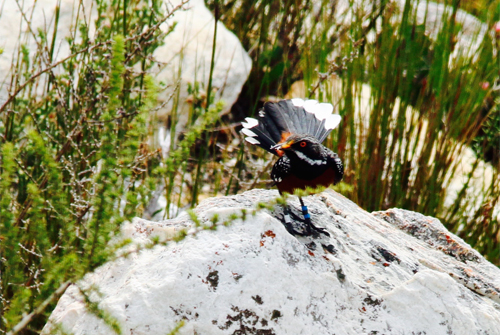Cameroon’s Tryst with Renewable Energy
By Ngoh Dong Augustine and Israel Bionyi
 |
|
Solar Panels on Display at AfDB Meet in Zambia. Photo credit: Israel Bionyi. |
The unease of doing business in Cameroon due to power outages is slowly but surely changing. A recent surge in renewable energy use with the harnessing of solar, wind, geothermal and hydel resources is bringing back investors’ confidence.
Cameroon first adopted the Energy Plan of Action for Poverty Reduction in 2006. Between 2009 and 2013, the government released its development strategy, Vision 2035, envisioning substantial investments in the energy sector, including renewables. The journey to universal access to energy is still driven by the 2035 Vision to Development. Cameroon endorsed the United Nations Framework Convention on Climate Change (UNFCCC) Paris COP21 deals and submitted a plan, the Nationally Determined Contribution (NDC) to climate change. The Plan pledges that renewable energy would constitute 25% of its total electric supply by 2035.
In small villages and rural towns, entrepreneurs and NGOs are also looking at innovative ways in the makeover. The Organisation for Integrated Rural Development (ORIRUDEV) is one such NGO based in Bamenda. The Northwest is a region where only 8% of the rural population are connected to the grid, despite the Menchum and Katsina Rivers flowing by. People therefore are largely dependent on kerosene and dry cell batteries for lighting, fuel wood and cow dung for cooking and to some small extent diesel generators for electricity. This situation is what ORIRUDEV is trying to remedy by its mission to set up a modern workshop to fabricate solar hardware.
With support from the Global Environment Facility (GEF), ORIRUDEV is currently promoting renewable energy and energy efficient technology in rural areas of the Northwest through fabrication, installation, operation, inspection and maintenance of energy solutions using locally available materials. Ngoh Dong Augustine is the C.E.O. and his team is engrossed to develop hybrid village power systems and a business model to provide cost-effective energy solutions.
New efforts to harness funds to invest in renewable energy sources in the country has seen key multilateral development investments leveraged via the AfDB partnerships coming to play. In 2014, Sustainable Energy For All (SEFA) - a multi-donor trust fund which promotes renewable energy and energy efficiency - approved a preparation grant of USD $777,000 to JMC Greenquest Solar Corporation to support the development of a 72 Mega Watt (MW) photovoltaic independent power plant currently implemented in Cameroon.
Mega national renewable energy projects like the 201 –MW Memve’ele, 30 MW -Lom Pangar and 15 MW -Mekin hydroelectric projects are also attracting investors from all over the world. Cameroon is posed to be a major exporter of clean energy in times to come.
Ngoh Dong Augustine is CEO of ORIRUDEV, Cameroon and Israel Bionyi, assistant editor, ACT.